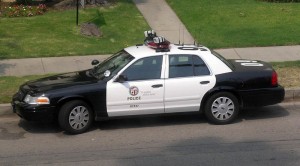
The LAPD is being sued for breech of privacy over the use of Automatic License Plate Readers (ALPRs), which are the next tool in police surveillance technology. On the surface, if used properly, ALPRs could help fight crime. However, the ability for this new technology to be accessed by individuals with less than honorable motives is very troubling.
Joshua Rhett Miller at Fox News is reporting that the American Civil Liberties Union (ACLU) is teaming up with the Electronic Frontier Foundation (EFF) in a joint lawsuit against the Los Angeles Police Department.
According to the lawsuit, the LAPD has been collecting massive amounts of data using ALPRs. These surveillance video cameras are located at traffic lights, street signs and in police squad cars, and can record as many as 1800 plates per minute, conducting approximately 22 scans for every one of the 7 million vehicles registered in Los Angeles County. By using these high definition cameras, the LAPD can track the movements of millions of motorists, and according to a June report in LA Weekly, the LAPD has already accumulated more than 160 million “data points.”
As EFF Staff Attorney Jennifer Lynch explains, a data point can be considered anywhere you often go in everyday life. “By matching your car to a particular time, date and location – and building a database of that information over time – law enforcement can learn where you work and live, what doctor you go to, which religious services you attend, and who your friends are.” Lynch feels that the public should have access to this data, seeing as the daily routines of countless law-abiding citizens is being recorded, monitored and documented.
The lawsuit goes on to say that the ALPR system also uses “hot lists,” comprised of “user defined data that is manually input into the informational data file so that ALPR users will be alerted whenever a ‘vehicle of interest’ is located.” The ACLU claims that this past October, they sent a second request to the Los Angeles Sheriff’s Department asking for more information regarding these “hot lists,” and that authorities declined to provide any details.
ACLU-SC Senior Staff Attorney Peter Bibring says he feels that police should treat location information from ALPRs like any other sensitive information. “They should retain it no longer than necessary to determine if it might be relevant to a crime and get a warrant if they need to keep it any longer. They should limit who can access it, who they can share it with and create an oversight system to make sure the limits are followed.”
However, Los Angeles County Sheriff spokesman Lee Baca said, “The irony is we share the concern of privacy. Do we want to release files on people who have done nothing wrong?”
Be sure to check back with the NCAVF for updates on this on-going case and developments with analyzing, enhancing, and testifying as an expert witness on video and audio surveillance and other related emerging surveillance technologies.